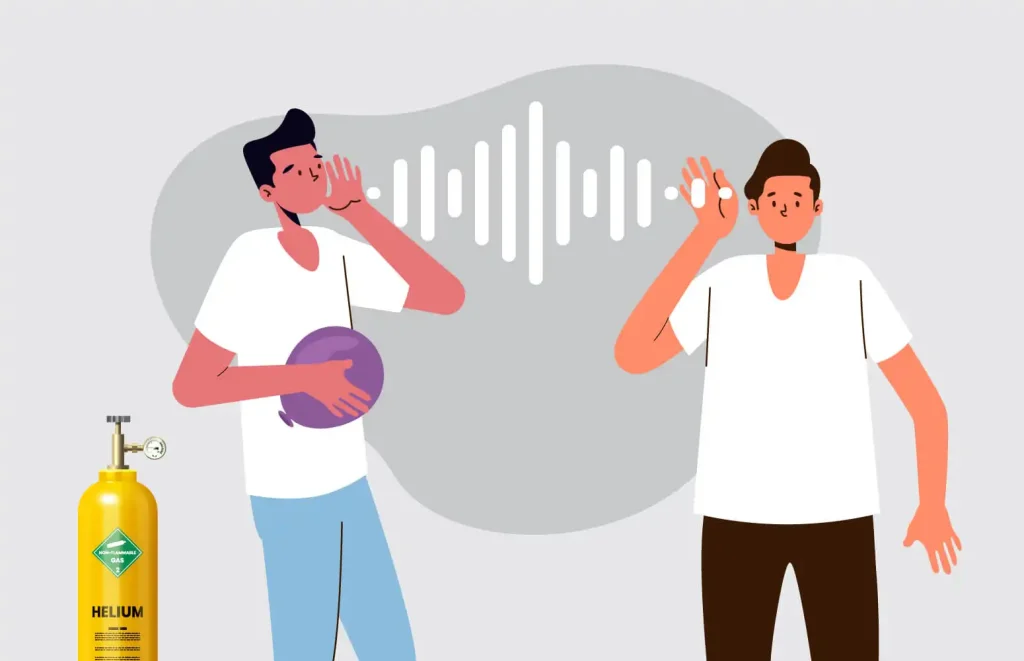Have you ever heard someone sound like a cartoon character after inhaling helium from a balloon? It’s a funny and fascinating trick, but have you ever wondered why it happens? Let’s dive into the science behind why breathing helium changes the sound of your voice!

What Is Helium?
Helium is a colourless, tasteless, and odourless gas lighter than the air we breathe. It is the second lightest element in the universe, right after hydrogen. Helium is often used to fill balloons because it makes them float in the air. But when you inhale helium, it does something quite extraordinary to your voice.

How Do We Produce Sound?
Let’s first look at how we produce sound to understand how helium changes your voice. When you speak, air from your lungs is pushed through your vocal cords (also known as vocal folds) in your throat. Your vocal cords vibrate, creating sound waves. These sound waves travel through the air and come out of your mouth as your voice.

Why Does Helium Change Your Voice?
The sound of your voice depends on the speed of sound waves travelling through the air. The speed of sound is different in different gases. In the air (which is mostly nitrogen and oxygen), sound travels at about 343 metres per second. However, sound travels much faster in helium – around 927 metres per second!

This is because helium is much lighter than the air we usually breathe. The lighter the gas, the faster the sound waves can travel. When you inhale helium, you temporarily replace the air in your vocal tract with helium. This causes the sound waves to travel faster and change the pitch of your voice, making it sound higher and squeakier.

The Science Behind It
When you speak after inhaling helium, the faster sound waves change the resonant frequencies of your vocal tract. Think of your vocal tract as a musical instrument. The size and shape of the instrument determine the pitch of the sound it produces. When filled with helium, your vocal tract produces higher frequency sounds, just like tightening the strings on a guitar produces higher notes.

Is It Safe to Inhale Helium?
While inhaling helium can be fun and entertaining, it’s important to be careful. Inhaling too much helium can be dangerous. Helium displaces oxygen in your lungs, and if you breathe in too much helium, you might not get enough oxygen. This can cause dizziness, fainting, and in extreme cases, suffocation. Always use helium responsibly and make sure you are in a well-ventilated area.

Fun Facts About Helium
- Helium is the second most abundant element in the universe: It was formed during the Big Bang and is found in stars, including our sun.

- Helium is used in various industries: it’s not just for balloons! It’s used in medical imaging, deep-sea diving, andeven cooling the magnets in MRI machines.

- Helium doesn’t solidify easily. Under normal pressure, it remains a liquid even at absolute zero (-273.15°C), and it only becomes a solid under extremely high pressures.

- The word “helium” comes from the Greek word “Helios,” meaning sun: Helium was first discovered in the sun’s spectrum before it was found on Earth.

Helium and Sound Experiments
You can try a simple experiment to see how different gases affect sound. If you have access to helium (and with adult supervision), you can try inhaling a small amount and speaking. You will notice your voice sounding higher and squeakier. Compare this to speaking normally or even speaking after inhaling a gas like sulfur hexafluoride (which makes your voice sound deeper).

Why Doesn’t Helium Have Long-Term Effects on Your Voice?
When you stop inhaling helium and start breathing normal air again, your voice returns to normal. This is because helium doesn’t have any lasting effects on your vocal cords or vocal tract. The change in voice pitch is purely due to the temporary change in the speed of sound in the gas you are breathing. Once you are breathing air again, the speed of sound returns to normal, and so does your voice.

Conclusion
Helium is a fascinating gas that can make your voice sound funny and high-pitched. This happens because helium is much lighter than air, causing sound waves to travel faster and change the pitch of your voice. While it’s fun to play with, always remember to be safe and responsible when using helium. Now you know the science behind the squeaky helium voice!
For more interesting articles, please visit www.kidzherald.com





